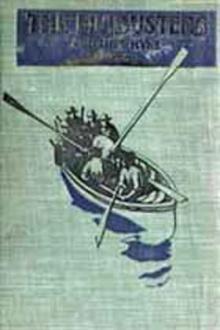The Filibusters, Charles John Cutcliffe Hyne [best book clubs .TXT] 📗

- Author: Charles John Cutcliffe Hyne
- Performer: -
Book online «The Filibusters, Charles John Cutcliffe Hyne [best book clubs .TXT] 📗». Author Charles John Cutcliffe Hyne
Finally, after two months of the most toothsome amusement, she went away, as suddenly as she had come, and this time the whirlwind was made up of warm-hearted Irish regrets. She had (as has been hinted) many volunteers who wished to escort her further, but they were of the male sex, and as she said she could not marry all, and did not wish to be specially slighting to any, she suddenly flitted away to London, which lies morally further from Fermanagh than New York does. She took only one extra person in her train, and that was a certain Miss Julia Armitage.
Now, Miss Armitage was a little lady of sprightliness, whose parent, a retired Colonel in the British service, had pinned himself down for life by commencing to rebuild the family castle on a scale of generous magnificence. He got the pulling down done very nicely and effectually, but when the new building began to rise above the cellars of the old he started to discover that the amusement was costing money. So when one half was completed he filled in the loose end with weather-boards, sent the masons away, and turned their sheds into stables for his hunters and polo ponies, and brought up his family in this halfhouse on potatoes and pomp.
“It is no doubt amusing for a while,” Miss Armitage said to Delicia, ” to live on a tesselated pavement of price, under a ceiling brought from Italy, and between walls where the bricks have never had their blushes hid by plaster. There’s variety in it, and there’s always the fun of speculating on what a fine place you might make of it if the family could only pay off a few of its last ten years’ debts and get a little ready cash for improve, ments.”
“I’d like it myself for awhile,” said Delicia.
“For a very little while, perhaps you might. You’re great at plotting and planning. But you like to think of a thing one minute and have it done the next, and that’s what we can’t do at our place. There’s no money. There never is any money. The other day one of my dearest friends wanted me to be a bridesmaid at her wedding, and I had to refuse because the dresses were light blue serge and that wouldn’t make an evening frock afterwards, and I couldn’t afford two for the year. It was sickening. I’ve never been a bridesmaid yet.”
“Then,” said Delicia, ” come along with me and be one of mine.”
“But you aren’t engaged yet? Or oh, I say! Have you accepted one of the boys round here? And never told me. Ah, I’ll never forgive you now.”
“Not a bit of it,” said Delicia. ” They’re all extremely nice, as I’ve told each of them; but I’m afraid that none of them individually would quite do to marry. Still the right man’s got to be found somewhere, because I’ve quite made up my mind to have a husband before I’m twenty.”
“And you’re nineteen now.”
“That is so,” said Delicia, “and I’m tired of having even the most harmless of duennas dangling at my heels. I’m going to indulge in a nice convenient hubby, and be my own chaperone, and do precisely as I like.”
“If you ask me, you seem to do that very tolerably now.”
“Hum,” said Delicia. ” There are different ways of looking at the same thing. Still, as I’ve said I’m going to try the husband attachment, you may be sure I shall do it; so you’d better come and watch the process, and then you’ll be able to act as bridesmaid at a moment’s notice. When’s there a train? Let’s go now.”
Miss Armitage got very red. ” I can’t,” she said. ” I mean, Delicia, dear, I’d rather not.”
“Now, my sweet child,” returned Delicia, ” look here. I know exactly what you’re thinking of. You’re trading on that terrible pride of yours, the fine old family pride which built this half house and made all your lives a burden to you. Put it in your pocket. The stuff’s not a bit of use. Just come along with me and help yourself out of my cheque book when you want to.”
“But, Delicia—”
“Now do be quiet. I’d do the same by you if things were the other way on. I haven’t a scrap of pride to my possession. It’s a useless commodity which you can make nothing out of and which only gets in the way. You have heaps more fun without it, and can do lots more things which you want to do.”
“You’re a darling, of course, and it’s immensely good of you, and I’d like to come awfully, and I don’t think I’d really be so very extravagant, even if you did give me the freest chance. But, Delicia, there’-s don’t you know there’s someone else I’ve got to think about.”
“And pray who’s that?”
“Why, Delicia, how silly you are. Of course I shall have to ask Charlie.”
“What, that Mr. Fluellen, the serious-looking person in the six photographs?”
“Delicia, don’t; I’m engaged to him, dear.”
“Of course you are, and that’s the very reason you should do what you want to first and ask him about it afterwards. I never saw such a girl. You always make a point of having your own way here, and I’m sure you’re not likely to care for a change afterwards.”
“But I couldn’t”
“Oh, yes, you could anything. But I’ll tell you what. We’ll compromise this matter; we’ll step across to London first, and there the man can call upon us. Then we’ll go on/l^
“Where?”
“Haven’t the faintest idea. I never cramp myself by making an armful of plans on ahead. Besides, it’s good practice to often make up your mind on the spur of the moment. Now, as I’ve said, I’ve decided upon going off and taking you with me, and you’d better come peaceably, because I’m quite equal to kidnapping you if you won’t. Run away now and write out a long telegram to the Fluellen man messages over thirty words always tickle people favourably and I’ll go downstairs and find some nice boy who will rummage the time-table for me.”
In twenty-four hours after this they were in London, and forty-eight hours later saw them settled down in Paris. Fluellen had not called; had not been able to call, so he said, being detained by regimental duties; but instead had written a letter which was, perhaps, a little stiff, and was certainly injudicious.
“You let him write to you like this?” said Delicia, in high scorn, when the sheet was handed her to read. ” My word! I’d marry that man tomorrow if I was engaged to him, and soon let him see who was going to do all the ordering.”
“You couldn’t,” said Miss Armitage, bridling up. ” His aunt’s just dead. That’s what’s been stopping us.”
“Why, bless me, that’s no reason. You can’t bring the poor woman to life again, or do her any good by remaining single.”
“But, Delicia, one must observe the conventionalities a little.”
“Some of them certainly, but when they are gratuitously foolish, I don’t see why. Eh? Hullo, I didn’t know it was as late as all this. Now you must get your shoes and some outdoor things put on within eight minutes or we shall miss the Club train, and that’s a thing I wouldn’t do for a diamond bracelet.”
“But, Delicia, your maid can’t pack for the pair of us in that time.”
“Who thought of packing? Can’t we buy a fresh set of everything in Paris? My dear child, you must get rid of these stay-at-home oldfashioned notions.”
It was in this manner, then, that Miss Julia Armitage was launched into an entirely new phase of life under Delicia’s auspices; and very good she found it; and very much she altered under the treatment, as was to be expected. Being an Irish girl and brimming with vitality, she picked up the new openings readily enough. She was a very accurate understudy of Delicia in two months’ time, and enjoyed the change to its full. Fluellen did not, which is perhaps no matter for surprise; but he said so bluntly, and from a distance, which was about as big an error as he could conveniently have made. Miss Julia Armitage began (most selfishly) to tell herself that ” Charlie, dear,” was selfish.
At last she put the matter in words. ” It is hard,” she wrote, ” that you should begrudge me this one piece of enjoyment. I’ve been penned up in one semisavage village all my life, with two inferior dances per annum, and horse-flesh and gunpowder for the entire scope of conversation. Now that I am in a way to learn that there are other ideas in the world besides these you write stiffly to me. I don’t think it is kind of you. Surely there is no harm in my becoming a woman of the world.”
Fluellen thought there was, though he did not say so in plain words. In the first instance he had fallen in love with this little ignorant Irish girl for her freshness and innocence of the wiles and uncleanness of the more fashionable world. She was just a lady, no more and no less, and that was all he required of her. But now that she threatened to develop into something very much more sophisticated and different he still did not wish to lose her. He had been inoculated with a love for her which had gone into every corner of his system, and which there was no getting rid of. He wearied for the sound of her voice. So he temporised, and said in his letters as little as possible.
“What a very dull person that young man of yours must be,” Delicia said at intervals; and the other girl, from hearing the statement so often, began to think there must be a grain or so of truth in it. In this way was she prepared for the coming of Juan Carmoy.
Don Juan by birth was a Mallorquin, the son of a noble family in Palma, and a grandee of profound descent. His immediate ancestors had (following the custom of their era) gambled most profusely and recruited their means in the time-honoured way. Consequently when young Juan came upon the scene the estate near Valledemosa and the gloomy old palazzo in Palma were all more or less securely in the grip of the chulta, which is the local equivalent for Jew.
Now, Don Juan with cleverness put this all forward first, and because there was something extremely homelike and Irish about the whole proceeding Miss Julia took a liking for the man at once. This liking remained even when she learned that he had been a traitor to his traditions and hers.
It seemed that he had soon tired of ” res angustae domi,” and had set off Pizarro-fashion across the seas to a land where rumour said there were other fine estates for the man who was man enough to grab them; and having plenty of enterprise, abundance of appetite, and no nice scrupulousness at all, had carved himself out of the Republic of Sacaronduca as fine and valuable a property as any gentleman might wish for. It is true that in the carving a number of





Comments (0)